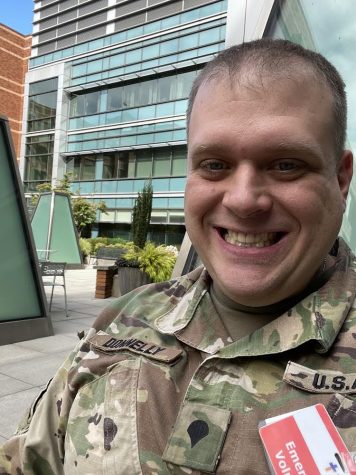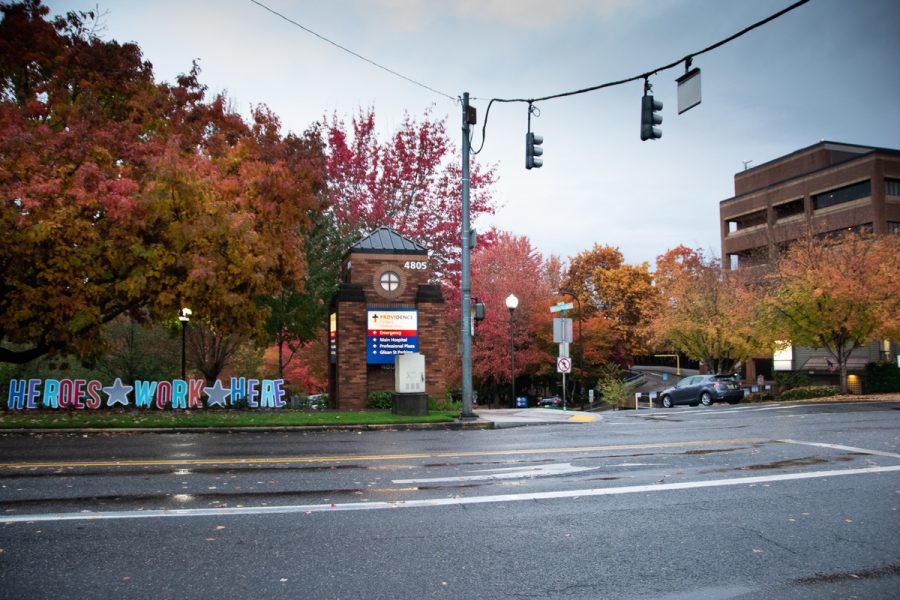Absent From the Classroom, Mr. Donnelly Serves in Local Hospitals as Part of the National Guard
Mr. John Donnelly has been volunteering at Providence Portland Medical Center since August as part of a larger group of National Guard soldiers who were called to help in hospitals during the pandemic.
October 20, 2021
For the past nine years that Mr. John Donnelly has worked at La Salle, he has generally started the school year the same way. Beginning in September, he returns to the classroom to direct the band department as a music teacher and instruct students in Yearbook and Music Technology classes.
But this fall, Mr. Donnelly has not been seen around the halls of campus.
Instead, he has reported each day to Providence Portland Medical Center. Here, he helps to support hospital security, monitor patients in the emergency department, and sanitize hospital rooms.
Mr. Donnelly is one of hundreds of National Guard members who have been mobilized in hospitals since August to assist with COVID-19 cases. He has been a part of the National Guard for eight years now, specifically serving in the 234th Army Band Unit of Oregon’s National Guard.
Many of Mr. Donnelly’s duties at Providence Portland Medical Center have served to help relieve the hospital from staffing shortages.
In Oregon and all over the country, hospitals have been burdened with surges in COVID-19 hospitalizations as the number of nurses and other healthcare professionals dwindles. On Oct. 7, the Oregon Nurses Association reported that 60 percent of OHSU’s nurses are considering leaving the profession.
While at Providence Portland Medical Center, Mr. Donnelly has witnessed the widespread shortage of nurses firsthand. “It was quite a shock to walk into the hospital on day one, to see what was needed,” Mr. Donnelly said.
Mr. Donnelly explained that, on a certain floor, there might be 12 patient rooms that require monitoring, but only two or three nurses to oversee all 12 patients. “They have to make sure they’re taking the right medication, [make] sure they’re getting fed, [and make] sure that the doctors are getting updated orders on what’s happening with these patients,” he said.
For certain tasks, such as proning a patient — or turning a patient from their back onto their stomach — a minimum of five people are required. When there are only two to three nurses working on a certain floor at a time, it can be difficult to perform these tasks. “You can see the need right there,” Mr. Donnelly said.
Mr. Donnelly also observed how a shortage of other hospital staff, like certified nurses’ assistants or cleaning staff, can contribute to the workload of already overworked nurses. When these staff members are not present, “that responsibility falls on the nurse,” Mr. Donnelly said. “So a nurse that is skilled enough to take care of medications, and find a patient, and work with a doctor on care plans is doing a job like cleaning a bedroom and making a bed. That’s taking them away from their primary job.”
It is in areas of struggle like these where Mr. Donnelly feels like members of the National Guard have been able to step in to support hospital staff. National Guard members have become the “primary resource” for jobs like proning patients and completing cleaning tasks, “tedious jobs that take medical staff away from a highly skilled position,” Mr. Donnelly said. “And it’s jobs that anybody can do. Anybody can make a bed.”
Although Mr. Donnelly has been deployed for certain duties as part of the National Guard in the past, these mobilizations have usually occurred over the summer, when Mr. Donnelly was not currently teaching. Two years ago, for example, Mr. Donnelly volunteered as a road guard in a Umatilla fire over the summer, and the year before that, he helped with two fires in southern Oregon.
With this most recent mobilization, there was a “sacrifice” that came with his commitment to support the hospital, Mr. Donnelly said. “My family has to sacrifice the time that I’m away, La Salle has to sacrifice, [and] my band kids have to sacrifice not seeing me.”
However, “it’s a sacrifice that’s needed,” he said. “It’s kind of ingrained in who we are as Lasallians, and it’s my opportunity to use my services to help somewhere as needed. So the decision wasn’t really hard.”
Through his experience serving in hospitals with the National Guard, not only has Mr. Donnelly had a chance to use his skills to support his community, but he has also gained new perspectives on the challenges facing hospitals during the pandemic.

On a day-to-day basis, Mr. Donnelly is asked to complete a variety of tasks related to hospital relief. Sometimes he works cleaning patient rooms and hallways, while other days he will help out as a patient sitter. “A lot of times, patients aren’t allowed to get up and walk around because they physically can’t, and then they will try to, and hurt themselves,” Mr. Donnelly said. “So we’re there to kind of watch and monitor.”
National Guard members are also trained to go into COVID-19 patient rooms and provide support, “whatever that may be,” Mr. Donnelly said. To go into a room with a COVID-positive patient, Mr. Donnelly has gotten used to putting on “all of the gear” to limit the possibility of an infection.
Although Mr. Donnelly’s experience working at the hospital has been “gratifying” in some ways, as has seen the way that he is able to aid patients and nurses on a daily basis, he also noted that some parts of the work have been “wearing” on him.
“Once you get onto a floor where the nurses are overworked, or they’re on an ICU, or they’re working with COVID patients… there is definitely this feeling [that is] hard to watch, to go through,” he said. “But at the same time, it kind of empowers me to keep on helping as much as I can.”
As Mr. Donnelly has continued to serve in the hospital the past two months, he has found that he has not only gained new perspectives on the staffing challenges in hospitals and how the National Guard has been able to provide relief, but he also now has a new, more intimate view on the pandemic as a whole.
“It’s kind of like maybe any conflict that we’ve seen in our lives,” he said. “We read about it, hear about it, and we try to associate the best we can with what we see and what we read. But what’s in front of you is completely different than what you read.”
“Being in a COVID positive room and seeing a patient on a ventilator, proning a patient that is on a ventilator, [and] seeing what they look like on a day-to-day basis is much different than what we see in our media,” Mr. Donnelly continued. “It did not prepare me mentally for what the actual situation [was] going to look like.”
“You know, we try to be as informed as humanly possible,” he said. “But nothing is more powerful than sitting in a room with a patient dying from something that hopefully could have been prevented. And that is certainly an eye opener.”
Mr. Donnelly explained that when he initially joined the National Guard, it was “to support our state as much as I possibly can,” he said. And through his services to the hospital, he feels he has fulfilled this goal. “I don’t always get a day to day opportunity to serve my community.”





